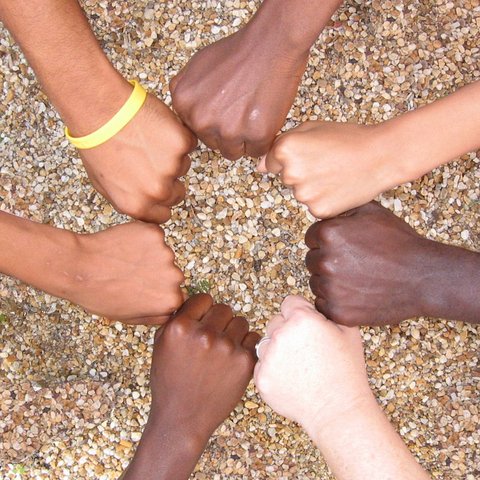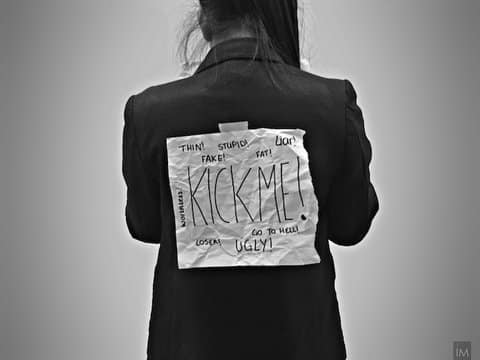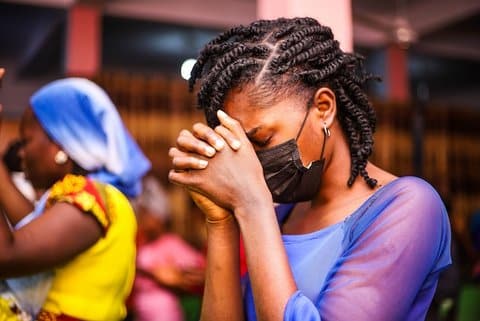
04 Jan See Race Relations Through the Eyes of Young People Coming of Age

(Photo by Clay Banks on Unsplash)
Editor’s Note: We asked a group of Kennedy students how they identify themselves, how they see race in themselves and others, and how they think views on race differ between them and adults. Here’s what they had to say. Their responses have been edited for clarity. This is part 2 of 2.
Read Part 1:
‘Younger People See Race Differently’: Teens Reflect on Identity
Commentary, Various Authors
I don’t care about race. I feel like because I am not from any country where people speak Spanish, (some) try to pull me down. My accent is not bad. All my friends and also teachers ask me where did I learn this accent from.
I am (from a) different part of the world. It is so different because I belong to the Hindu religion, and people here don’t follow any religion. I just explain my culture. They love to listen, and I love to explain.
In school, whenever I say I am not Mexican, they ask me, what are you, and I tell them I am from Nepal. They ask me where is that, and I tell them it’s in Asia, and they say, oh, it’s India, which is not true. India is a different country. Young kids don’t know much, so they are just curious, I guess.
— Pramita Bhusal, 16
The most important way I identify myself is usually race. Being Mexican is very important to me because of how much my parents have gone through. Saying that I’m Mexican means that I’m proud of my parents’ struggles to get where I am right now. It also means I’m not ashamed of being Mexican; most people are because of how people treat us. I usually do identify myself with other important things, but my race is the most important to me.
I engage with people of other races often because I go to a school where there are a lot of different races, which I interact with to do my work most of the time, especially because I’m in leadership. Being part of leadership helps me communicate with other races more often since they express their issues involving school events. I do have friends who are different races from me. The difference interacting with people with different races or any person other than myself is that they have different personalities. I wouldn’t say that people that aren’t my race act differently because everyone acts differently because everyone has a different personality and a different point of view in everything.
I don’t remember the first time I truly thought about my racial identity. Since I’ve always attended diverse schools, I’ve never actually paid attention to my racial identity or anyone’s, for that matter. I do think young people see the issue of race differently than adults. Young people don’t care about race in the way adults do because some adults like to discriminate (against) others just because of their race. Although young people look past race, they still are open and speak up when it comes to race discrimination, telling adults where they’re wrong and trying to teach and help them.
— Mariana Calvario, 16
I don’t define myself by race, but I would define myself like I am an ambivert. Some people know me as shy and quiet, and some people know me crazy and loud. It depends who I am with because I am such a crazy person once I get comfortable with people.
I only engage with people of other races because I never see people who have the same ethnicity as mine. I made a good amount of friends who are different races, and they all are the kindest and sweetest ever. They really made me feel special and important, and I feel safe when I am with them. The difference is I can relate so many things with people who are the same race as me, and we easily get each other; the people with other races, it took me a while to get to know them because they have different traditions and culture.
I don’t remember the last time I talked about racism. I don’t talk about my race. I don’t think young people see the issue of race differently than adults. Instead of seeing issues, young people really get curious to know their culture and tradition stuff.
— Bhumika Jirel, 16
The most important way I identify myself is through race because I feel proud to be Latina, to be specific, Salvadorian. Being Latina is one of my favorite things about myself. I love immersing myself in my culture. I love to eat pupusas, one of my traditional homeland dishes, which I hope one day to learn how to cook. I love being bilingual and being able to help someone who isn’t. Lastly, I love the varieties of music there is to listen and dance to.
>>>Read: Music at Home: the Sounds That Shaped Us
I engage with people of other races in my classrooms. I don’t really interact with people, in general, though. I’m kind of more in my own world but I would love to learn about more cultures and traditions of people of a different race/ethnicity from me.
I first had to think about my racial identity in school because that’s where I learned about historical events and people which I have some type of ethnic / racial relationship to. This was not taught to me at home. I talk regularly about race and racism at school, specifically in my ethnic studies and African American studies classes. I don’t think young people see the issue of race any different from adults for the simple reason that most adults tend to take things seriously, and racism is a very serious and delicate topic. As for young people — to be exact, students — racism nowadays isn’t as normalized as it was before, and it is talked about in most schools in the U.S.
— Emely Pascacio, 14
I (identify myself by) my race and my personality because it is a massive factor of who I am and my race shows my origin. My character shows what type of person I am and what I enjoy. My character can show people if I am kind, if I’m hardworking, and if we are comparable with each other. My culture shows where I grew up, the food I eat, and the traditions I have. My race and personality tell a story of my life and the challenges I have experienced.
I engage with other races in my life because it can show that we can get along together. I have a close friend who is a different race from me. I feel there is no difference. It is mostly about personality. As long as someone has a good and kind personality, they can (enjoy) each other’s company. They also can share each other’s differences and that can help each other grow in many ways. That can strengthen a community. It can help people understand and engage with each other.
I had to talk about my racial identity at school, and that made me think about my race and who I am as a person. I don’t talk about race or racism, but I should since both are important topics that need to be discussed. I think young people do see race differently than adults due to the fact that race has changed. Some say that young people have questions about since young people are naturally curious. They have questions as a way to understand something to learn and things in their way.
— Yanira Paxtor, 16
The way I identify myself is by how I look, act and represent as MYSELF. I don’t exactly use my color as how I identify because that would be stereotypical. I feel that color isn’t who you are; it’s how you show yourself. I identify as a young strong Chicana with street smarts and book smarts.
I engage with all types of people whether they have a different ethnic background or religion. I don’t exactly notice their race. I have many friends who are different races. I love meeting people with different backgrounds and different cultures, because its always fun knowing more and more about people. I find it better that everyone sees within everyone else’s shoes.
The first time I had to think about racial identity was when I was in fifth grade. My elementary was mainly people of color. There was only one white girl. She ended up joking about it, and it felt wrong to me. We had more white teachers, but the students were all Black and Hispanic. The one white girl used to joke and say she was the daughter of Donald Trump, and being kids, we were all laughing but something in me sort of spoke, and I got confused. I think that was the first time I really thought about race.
— Jasmine Sanchez, 15
Race is definitely an important way to identify yourself, but it’s not the only way. You can’t solely identify with race. You can identify with gender, interests, and activities you do. I identify myself with the music I listen to and hobbies You also can’t not identify as a race. Race is about how you look, how others perceive you.
I’d say almost every day I talk to people of different races. My school is very diverse. I tend to talk to people of my race, though. There’s no specific reason. I think it’s just who I “connect” with more. My closest friends are all Latino but not all Mexican.
I think the time I started thinking about my race was when I was in elementary school. Not everyone looked like me, and even people of my ethnicity don’t have the same skin as me or certain features. I don’t necessarily talk about race, but if it’s spoken about, I’ll maybe contribute to the conversation. I think young people/my generation does think differently about race than adults. Sometimes adults are very racist or insensitive, but my generation can also over-exaggerate and take things too far. It goes both ways.
— Cecilia Ponce, 16
I identify myself primarily as Asian American or Asian. It’s definitely race. It has cultural connection and diversity. Being Asian isn’t always fun and easy. During 2020-21, it wasn’t an easy time to be Asian. My people were attacked and dehumanized by the general public. Being inclusive can also help you relate with other people of color. Representation is a big thing because of breaking stereotypes.
>>>Read: Racism and Violence Against AAPI People ‘Is Nothing New’
I engage with other people of color quite frequently. Bay Area/Richmond is one of the most diverse cities in the world. I think it’s the language barrier and different experiences that are most different. My friends vary from white, Hispanic, Asian, Middle Eastern, African, etc. There are different experiences between us like what we endure as people of color in a predominantly white-ruling world.
Third grade or at least elementary school was when I had to think and ask about my racial identity. A lot of people would question my racial identity and definitely didn’t have the nicest words to say about me. I talk about race and racism quite often; it might be every day. POC unity is definitely a thing, but it probably isn’t as strong as you think. A lot of people of color are very racist. Young people now definitely see the issue differently. It’s handled differently. Young people are more firm about wanting a change.
— Peter Paul Guinto, 15
I think it is important to identify with your ethnicity rather than your race. Race is more based on how one person looks or skin color, but most people feel connected to their culture. Ethnicity reflects on your culture, language, traditions and values. It makes you identify yourself on a deeper level with other people. Most Latino people are connected more with their ethnicity than race because there is not really one that Latinos want to categorize themselves in.
I think the only time I engage with people from other races is at school because more people from different races have a common place to be. Usually, I don’t see other races at a Latino grocery store. I mostly had Latino (friends) mostly because there were more Latino students in my classes, so I made friends with them. I think the main difference is how you feel connected to them. When you meet someone from the same ethnicity and or race, you already have an idea of how they have common stories.
I think the first time I had to think about my racial identity was back when we saw a lot of immigrants and that made me really scared about my family. I do not really think about race and racism that often, mostly because I have other things to worry about, and I do not really encounter situations where I need to be talking about it. I think that young people and adults see race differently because I think young people want to talk about it more often and bring up issues of representation. I feel that many older people do not really see the issue like that. But there is also a lot in between, so it’s hard to tell.
— Laura Leon, 15
My race is the most important way to identify me. I think being Black is cool, so I choose to be Black. I also think a good way to identify me is my personality. I think I am a pretty chill and relaxed person, but I can also be as explosive as I need to be.
I engage with people outside of my race a bunch. I do that more than I engage with people of my race, at least at my school. I don’t like to engage with people of my race in school. Outside of school, the African American people I know are pretty chill, but in school, people of my race tend to cause a lot of trouble. Also, I grew up around more Latino people in Richmond because there were more Latin American kids than African American kids in my school.
I don’t talk about racism and racial identity at home. So far in my life, I have never experienced it and haven’t dealt with it yet. I think young people take racism more as a joke. We don’t see it as serious and we joke about other races a lot mainly probably because we also have never experienced true racism like our grandparents and great-grandparents did.
— Jeremiah Baker Brice, 16
This resource is supported in whole or in part by funding provided by the State of California, administered by the California State Library in partnership with the California Department of Social Services and the California Commission on Asian and Pacific Islander American Affairs as part of the Stop the Hate program. To report a hate incident or hate crime and get support, go to CA vs Hate.






No Comments